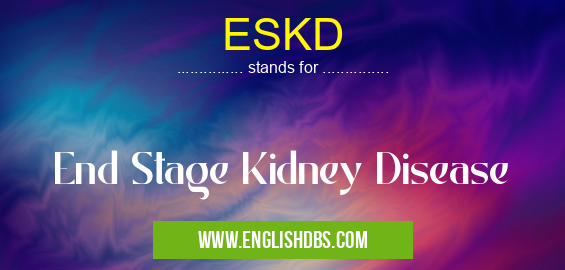What does ESKD mean in NURSING
ESKD (End Stage Kidney Disease) is a medical term used to describe the complete and irreversible loss of renal function. It is the final stage of chronic kidney disease (CKD), which occurs when the kidneys can no longer effectively filter waste and toxins from the blood. As a result, harmful levels of these substances accumulate in the body, leading to a range of health issues.

ESKD meaning in Nursing in Medical
ESKD mostly used in an acronym Nursing in Category Medical that means End Stage Kidney Disease
Shorthand: ESKD,
Full Form: End Stage Kidney Disease
For more information of "End Stage Kidney Disease", see the section below.
Causes of ESKD
ESKD can be caused by a variety of underlying conditions, including:
- Diabetes
- High blood pressure
- Autoimmune diseases
- Kidney infections
- Polycystic kidney disease
- Prolonged use of certain medications
Symptoms of ESKD
The symptoms of ESKD typically develop gradually and may include:
- Fatigue
- Weakness
- Nausea and vomiting
- Decreased appetite
- Fluid retention
- High blood pressure
- Anemia
Treatment Options for ESKD
There are two primary treatment options for ESKD:
- Dialysis: A procedure that uses a machine to filter waste and toxins from the blood. Dialysis can be performed through two main methods:
- Hemodialysis: Blood is drawn from the body and passed through a dialysis machine.
- Peritoneal dialysis: A solution is introduced into the peritoneal cavity, which lines the abdomen. Waste and toxins diffuse into the solution and are then removed.
- Kidney transplant: A surgical procedure that involves replacing the diseased kidneys with healthy ones from a donor.
Essential Questions and Answers on End Stage Kidney Disease in "MEDICAL»NURSING"
What is End Stage Kidney Disease (ESKD)?
End Stage Kidney Disease (ESKD) is when your kidneys are functioning at less than 15% of their normal capacity, meaning they can no longer filter waste products and fluids from your blood.
What causes ESKD?
The most common causes of ESKD are diabetes and high blood pressure, which can damage the kidneys over time. Other causes include autoimmune diseases, kidney infections, and certain genetic conditions.
What are the symptoms of ESKD?
In the early stages of ESKD, you may not experience any symptoms. As the disease progresses, you may notice: fatigue, weakness, loss of appetite, nausea and vomiting, swelling in your legs or feet, shortness of breath, and high blood pressure.
How is ESKD diagnosed?
ESKD is diagnosed through a blood test that measures your kidney function, known as a glomerular filtration rate (GFR). Other tests, such as a urine test and imaging studies, may also be used to confirm the diagnosis.
What are the treatment options for ESKD?
The main treatment options for ESKD are dialysis and kidney transplant. Dialysis is a procedure that uses a machine to filter waste products and fluids from your blood. Kidney transplant involves replacing your damaged kidneys with healthy ones from a donor.
What are the risks and benefits of dialysis?
Dialysis can be a lifesaving treatment, but it also has risks, including infection, blood clots, and electrolyte imbalances. The benefits of dialysis include removing waste products and fluids from your blood, controlling blood pressure, and improving your overall health.
What are the risks and benefits of kidney transplant?
Kidney transplant is a major surgery, and it carries risks, including infection, bleeding, and rejection of the new kidney. The benefits of kidney transplant include restoring kidney function, improving your overall health, and giving you a better quality of life.
What lifestyle changes can I make to manage ESKD?
If you have ESKD, there are a number of lifestyle changes you can make to manage your condition, including: controlling your blood sugar and blood pressure, eating a healthy diet, avoiding tobacco and alcohol, getting regular exercise, and taking your medications as prescribed.
Final Words: ESKD is a serious medical condition that requires ongoing treatment. With proper management, individuals with ESKD can live full and productive lives. However, it is important to be aware of the symptoms and seek medical attention promptly if they occur.
